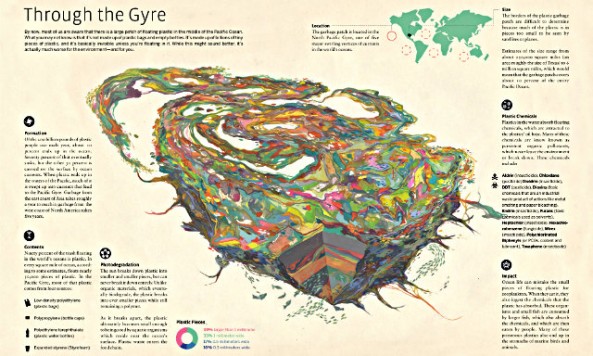
Not that anyone reads it, but we have a brief writer's guide here at RamsHerd. Right at the top, it says:
We aren’t a magazine or a newspaper, but we can follow a basic journalistic code:
- be unique
- check your facts
- check your spelling
- and don’t rip people off.
That was my attempt at setting some kind of standard to stave off the worst of online bloggerly behavior, and to let the (mostly) young and (mostly) inexperienced writers that volunteer their fingers here know that I actually expect something of the old code from them.
Honestly, I feel like I shouldn't even have to say stuff like this. But let's face it, the internet has succeeded in almost totally destroying the believability of the written word.
Oh, as a publishing engine, it can't be topped. More people can publish more words in less time than at any time in human history. (That isn't a compliment, internet.) But as a "knowledge engine," it both sucks and blows.
As online readers, we are surrounded by verbal garbage, as commentary and veiled advertisement supplant fact-gathering and reporting as the primary function of media. Increasingly, our job as readers isn't to consume, it's to reject. We have to weigh on a constant basis the credibility of each source that provides each bit of new information. And our own credibility is judged on a constant basis with each utterance, each post, each tweet and retweet.
This is the central conflict that fueled my colleague Paul's diatribe yesterday on Twitter and "the death of journalism." It's an enduringly valid point, especially in the fact-starved run-up to the NFL Draft.
But we, as a site, got a key part of it wrong.
It was this rumor, but it could have been any other
This was the pair of tweets that started this brush fire.
Rams won't be using the franchise tag on WR Danny Amendola, but are considering other options in order to keep him.
— Adam Caplan (@caplannfl) March 4, 2013
Funny/rediculous rumor is that they are considering using the transition tag ($5.194 M) for him as a TE.
— Adam Caplan (@caplannfl) March 4, 2013
These were then picked up and run with as grist for a story by ProFootballTalk / NBC Sports, and eventually republished / reblogged / whatever by at least seven other online outlets (not counting this site). This is par for the course for Caplan and his brethren such as Adam Schefter, Jay Glazer, Jason LaCanfora, Gregg Rosenthal, Albert Breer, and the like.
For Caplan, this is a fraction of his workday. Two of roughly a hundred miniature updates fanned out over the course of a Monday in the offseason. This story wasn't a particularly big deal, but it got a little bigger when an amateur writer in St Louis decided to get angry.
Hence yesterday's fatally flawed article, raging against the (mis)information machine.
In his swing to put a dent in the credence of other internet writers, our writer forgot to check his own. He failed (whether inadvertently or purposefully is beside the point) to do a basic level of credibility check on the reputation of Mr. Caplan, a veteran trafficker in NFL inside knowledge and a twelve-year member of the league's reporting fraternity.
Again, the credibility check is something that happens all the time, even among rumor-mongers. It does the brand of PFT no good to pick up just anything said by just anyone and consider it runnable. But once a nugget of potential news passes through the filter of a trusted source, it becomes reportable.
An aside:
To a member of my father's generation, this in itself is an unthinkable slippage in the standards of capital-J Journalism. He cut his teeth reporting in Florida on environmental ravages by phosphate mining and other Big Industry back in the seventies and eighties, and back then it was unthinkable to publish a story without sources. Plural. With names. Bob Woodward's "Deep Throat" business (anonymous, single-sourced reporting) that took down Richard Nixon was simultaneously groundbreaking and appalling, and probably only worked because Nixon was so obviously deserving of a fall. But it was by far the exception in news reporting. Now, it would be the norm.
End aside.
Anyway, so this credibility check is our real-time substitute for the multiple-sourced standard of olden days, and it is supposed to amount to the same thing. In order to pass our built-up rejection filters, new and unusual information is immediately put through a kind of relationship matrix.
We ask: "Do multiple people that I trust {like-follow-circle-whatever} this person? Do they interact with each other as peers?" If the answer is yes, as with Caplan and his fraternity, then we digest the new information and argue it on its merits. If not, we just reject or ignore it and move on.
At least, this is the way it should work.
Our man Paul wanted to protest the whole cycle of rumor-passing dressed up as reportage, but he tragically kneecapped his own argument by basically not knowing who Caplan is. (Internet: this is the part where you say #SMH #SPROTS and/or #AMAZEBALLS.) This site's article failed to live up to this basic standard of new-journalism, all the while pointing out a lack of journalistic standards in Caplan, PFT editor Mike Florio, Rams-focused superblog Turf Show Times, and pretty much anyone else that happened by. Irony much?
Can you clean up a whole ocean?
Jacob Magraw-Mickelson / Good Magazine: "The Great Pacific Garbage Patch"
There's a semi-famous amalgamation of plastic garbage — totally unnecessary human cultural refuse — that is clumped together in the middle of the Pacific Ocean. It sits in the center of the North Pacific Gyre, a massive natural eddy current that swirls on itself endlessly; a timeless natural force that is now perfectly adapted to pull in new bits and pieces of floating trash every day.
Birds and fish feed on the garbage, of course, because it's all sitting there in the water, broken up into tiny bite-sized nuggets, interspersed with the actual good stuff that birds and fish like to eat. In fact, the plankton and shrimp and whatnot that birds and fish like to eat probably are eating this plastic junk the whole time, further blurring the line between food and not-food, and passing that confusion up the food/not-food chain.
This colossal environmental pollutant spreads out over a massive area, described in size as anywhere from "twice the size of Hawaii" to "bigger than the continental US." But because it is made up of diffuse, degraded particles that are mostly submerged just below the surface, it cannot be seen by the naked eye, nor by satellite photography. Not even when you're sitting on a boat right in the middle of it.
Or so the story goes. This unbelievable and ever-growing pile of crap is either the perfect real-life metaphor for our plight as media consumers trying to separate fact from fiction, or it is itself a perfect example of an internet-fed hoax-fact that hooked even a conscientious sucker like me. (Because it's convenient for this narrative, let's play along and call it metaphor.)
Our brains are perfectly evolved to find patterns in things. But every bit of lie nestled with truth, every piece of guesswork or bit of surmise floated out there on a daily basis all collects, somewhere, in that pattern.
Whether we consciously accept or reject them, the elemental doubt reflex is re-triggered in our brain and slowly erodes our confidence in the next thing that we hear, read or see. We are being poisoned by the constant availability of barely filtered and wholly unnecessary information.
This is the way I feel. And frankly, it's exhausting.
When I started this site four years ago, I was given a very simple target by my friend Bryan Douglass: "Post something at least three times a week." At the same time, I had a very simple mantra of my own that I felt I had to live up to: "Don't just put shit out there." These dueling goals have been at war ever since.
At the time, three posts a week was considered a bare minimum. It is laughable to consider now. For a modern sports blog / news outlet, that standard is more like five to ten posts, plus 50-100 social media updates, every single workday until you die or burn out or both.
This is another aspect, often unspoken, to modern journalistic credibility. You're expected to always be on. You're expected to have a take on every stupid goddamn thing that any other person that's in your respect-network is talking about. You're also expected to go out and mine data or the rumor mill or pop culture references or whatever to give them all something new to talk about. There's a volume level that must be reached before you can be accepted as "credible."
I ramped up my volume for a while, and I recruited help along the way, but I couldn't keep that kind of pace going for very long. Other nagging things (roughly and sardonically called "real life") and my own lack of ambition in this arena kept pulling me away.
So here I am, in a diurnal ebb. I've dedicated the last month of my work life to helping push out a massive public release of scientific data, while not cutting back on my free-lance work (day-care doesn't pay for itself), while also trying to remain recognizable to my wife and children. And to be honest, it's been really satisfying.
So instead, I became a ghost to this website. My Klout score is dropping, my tweets are as scarce as hen's teeth, and my post count is woefully short of even the laughably low mark of three posts per week that we set as our original standard. I have kept the lights on so others whose work I enjoy can post here, but then comes Monday's facepalm, potentially sinking the credibility of the site, and all those associated with it.
An apology, and a decision
None of us here are in either Mr Caplan's or Mr. Florio's professional fraternity, but young men like Brennan and Tim that have written here aspire to be, either as journalists, coaches, or something in between. I want them to be able to point to the work they've done here with pride and without apology. Because frankly, they deserve to.
I doubt either man needs to hear it (or will ever become aware of it), but here you go:
I regret the characterization of irresponsibility published here as regards Adam Caplan and Mike Florio.
Not because the article was wrong in his basic point about the fallibility of this fragile "trust network" model of reporting, but because of the unwitting extreme to which our writer took it. I considered taking the post in question down, and I still may, but I find the conversation that followed to be worth preserving. Plus, one of the other enduring lessons of internet journalism is that once something is published, it never truly goes away.
I could reprimand the writer in question, or fire him (do you fire volunteers? Is there a distinction when I am a volunteer too?), but the point is moot. I don't want to do this any more.
It's time to stop throwing things in the ocean and hoping they aren't crap. It's time to move on.























